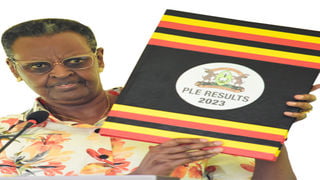
The Minister of Education and Sports, Ms Janet Museveni. PHOTO/FRANK BAGUMA
|Education
Prime
Where are they? Over 122,000 pupils miss PLE
What you need to know:
- Monitor's analysis of Uneb statistics revealed that three out of every 100 pupils who successfully registered for PLE did not sit in the last eight years.
Sharon Winnie (not real name), 12, successfully registered for her Primary Leaving Examinations (PLE) last April at a school in Kagadi District.
Since joining the school in 2017, Winnie regularly attended class. It appeared a given that she would write her final exams at the school, yet she was conspicuously absent during the PLE briefing last November.
The school administration would later learn that the pupil pulled out because it suddenly dawned on her aunt that the school’s religious beliefs didn’t align with Winnie’s.
Winnie is among the 122,729 pupils who per the Uganda National Examination Board (Uneb) failed to sit for the exam despite registering to do so between 2015 and 2023. Uneb disclosed the figures while releasing the PLE results last Thursday.
The results, which were officially released by Education and Sports minister Janet Kataha Museveni, indicated that 736,931 candidates out of the 749,254 pupils who were registered, turned up between November 8 and 9, to do the exams. Ms Museveni, who is also the First Lady, was irked despite the number of absentees in 2023 reducing from those registered in 2022.
“When a child fails to show up for their end of cycle examination, it is a waste of that life and resources for the entire education system and the families,” Ms Museveni said last Thursday.

Inmates celebrate their good performance in the Primary Leaving Examination (PLE) at Luzira Upper Prison on January 25, 2024. PHOTO/FRANK BAGUMA.
The continuous annual registration of annual Primary Seven candidates whose whereabouts are not later tracked by the government and schools prompted Ms Museveni to re-echo her 2023 appeal.
“Therefore, I reiterate the appeal I made last year to the parents and teachers to ensure that a child who has been registered to sit their end of cycle examination does not miss doing so,” she added.
Both government and private school owners and education experts could not pinpoint the whereabouts of PLE absentees, especially those who missed their examinations in the last 10 years.
An analysis of multiple Uneb datasets by this publication indicated that one out of every three children who have been registering for PLE has snubbed the exams in the last eight years.

*Source: Uneb
Between 2015 and 2023, a total of 122,729 Primary Seven candidates did not turn up for the examinations, despite fully registering with their respective schools.
This figure represents 2.5 percent of the 4.87 million who turned up in those years. Of these, 4.74 million wrote their final exams.
Why don’t they turn-up?
Ms Milly Nassolo Kikomeko, the director of Holistic Africa Foundation, a non-governmental organisation (NGO) which focuses on uplifting the lives of the underprivileged, especially children, said multiple factors contributed to the absenteeism.
She lists early marriages, teenage pregnancies, financial constraints and sickness as the leading causes.
“We don’t have free education as it is preached. You find that when the parent manages to pay Uneb registration, they [can’t afford] school fees or other requirements, which make most pupils miss [the exams]. There is also another issue of late preparation by schools, where you find that this demoralises the candidates,” she said.

Abraham Amanya celebrates with his parents and pupils of Bishop Asili Memorial Primary School in Kabale Town after scoring Aggregate 4. Ninety-seven pupils out of the 100 who sat sat for 2023 PLE at the school passed in Division One. PHOTO/ROBERT MUHEREZA.
Child marriage and teenage pregnancies have been a big problem among girls. For the boys, the issue of child labour sticks out like a sore thumb.
Ms Kikomeko said “the issue of discrimination among people living with disabilities right from school to work places” further complicates matters.
The recently released 2022 Uganda Demographic and Health Survey (UDHS), indicates that 25 percent of girls between 15 and 19 years are either pregnant or have had their first born.
Mr Filbert Baguma, the Secretary General of the Uganda National Teachers Association (Unatu), said automatic promotion accompanied by some of the factors raised by Ms Kikomeko are to blame for increased PLE absenteeism.
“Some of these children come and register when they are not ready for exams but just because they were promoted and when they reach the time of examinations, they shy away,” he said, adding, “Another thing is domestic violence in homes where the two parents are always fighting and maybe the mother leaves the home, making the children redundant and end up missing their examinations.”

The general secretary of the Uganda National Teachers’ Union (Unatu), Mr Filbert Baguma. PHOTO/FILE/COURTESY
Experts and educationists this publication spoke to, highlighted other issues such as lack of self-esteem among candidates, and regional imbalances as the main drivers of PLE absenteeism.
“These issues are no different from those that cause high failure rates. Most of the children are affected by both internal and external factors that end their education journeys half-way,” Mr Hasadu Kirabira, the chairperson of the National Private Education Institutions Association (NPEIA), said.
Annually, an average of 15,000 candidates don’t write their final exams despite registering. Experts fear that the figure will increase unless something is done.
Monitor's analysis of Uneb statistics revealed that three out of every 100 pupils who successfully registered for PLE did not sit in the last eight years.

Primary Seven pupils of Golden Stars Primary School prepare to write their Primary Leaving Examinations on March 30, 2021 during Covid-19. PHOTO/DAVID LUBOWA
The biggest number of absentee candidates was registered in 2022 where 20,844 out of the total registered 832,654 did not show up. But the trend, despite stagnating around 12,000, had reduced from the 19,614 and 17,427 absentee candidates who had been registered in 2015 and 2016 respectively.
But in terms of percentage of absentees out of the total registered, 2015 and 2016 triumphed with 3.2 percent and 2.7 percent respectively.
Important to note also is that the total number of registered candidates also stagnated at between 600,000 and 700,000 from 2015 to 2020, shot to more than 800,000 in 2022 before reducing to less than 750,000 candidates in 2023.
Busoga and Karamoja sub-regions account for the biggest number of PLE absentees while western Uganda where cultures that allow early child marriage may be contributing to absenteeism among girls.
Solution
Mr Baguma asked the government to first track the implementation of the compulsory primary and secondary education initiative and also equip schools with what they need to ensure that all children who go to school complete.
Relatedly, Ms Kikomeko said interventions must be made in fees structures, especially in Universal Primary Education (UPE) schools so that most children who are poor are allowed to do their exams.
“We need increased sensitisation to avert numerous factors like the cultural beliefs that made Winnie not turn up, some parents are just ignorant. The issue of discriminating against PWDs should be tackled,” she said.
Mr Kirabira said: “It is time for us school heads and owners to sit with the government including the Ministry of Education and Sports and Uneb and parents so that we come up with the lasting solution for this undermined but big problem. This problem cuts across because every child who fails to turn up, at least one of the three stakeholders above is involved.”
The State Minister for Higher Education Mr John C Muyingo acknowledged this problem and said his ministry is doing its best to reverse the trend.
He said that the government is soon declaring universal and compulsory secondary education “where we shall encourage every child of school-going age to access education.”
Museveni furious
While officiating this year’s NRM Liberation Day celebrations in Jinja, President Museveni attacked UPE schools that are charging learners.
“On my way to Jinja today, Maama Janet and I stopped in Nyenga, Buikwe District and interacted with the wananchi (citizens), many of whom were children. It was disturbing to find out that many of these children are not in school because teachers have expelled them due to non-payment of fees,” Mr Museveni posted on X (formerly Twitter).
“The NRM government introduced UPE in 1997, but the head teachers and PTA are abusing it. If the capitation grant is not sufficient, they should inform us so that we can provide additional funding instead of sending these children out of school,” he added, vowing to initiate a campaign on this issue in the coming financial year.

President Museveni inspects a parade during NRM's Liberation Day celebrations in Jinja on January 26, 2024. PHOTO/ DENIS EDEMA
The 2016 Education Abstract indicates that 1,888, 847 pupils including 949,261 boys and 939,586 girls were enrolled in Primary One in 2016.
Of this number the 2023 Uneb statistics indicate that 749,254 children including 391,558 (52 percent) girls and 357,789 (48 percent boys), an indication that 1,139,593 children did not complete their primary education.




